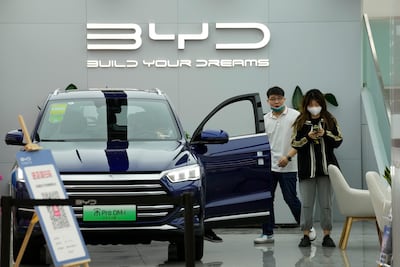The Philippines, Vietnam and Indonesia are competing to host an electric-vehicle assembly plant for BYD, the world’s second-largest maker of EVs, a senior Philippine trade and investment official has said.
The Chinese company is in an “advanced stage of discussions” with the Philippines, the South-East Asian nation’s trade undersecretary Ceferino Rodolfo said on Wednesday.
BYD representatives scoured the Philippines for possible factory sites during a visit late last year and the company may decide on the site during the second quarter, said Mr Rodolfo, who also heads the board of investments.
BYD, which is already set to build its first EV production centre in South-East Asia in Thailand, is still exploring whether the new factory will be a full-blown assembly plant or a final-assembly facility with car parts shipped in from overseas, said Lanie Dormiendo, director for the Philippines’ International Investments Promotion Service.
A representative of Shenzhen-based BYD said the company doesn’t have “any relevant information to disclose".
Talks between BYD and Indonesia over a potential investment in an EV factory in the country are ongoing, according to a person familiar with the matter who asked not to be named as the discussions are private.
The Indonesian government is offering a slew of tax holidays, incentives and access to battery raw materials to convince the car maker to set up there rather than expanding in a neighbouring country like Thailand, the person said.
BYD didn’t immediately respond to a request for comment on Indonesia.
“The mere fact that BYD is scouting for auto manufacturing sites in Southeast Asia highlights how global it is setting its sights,” said Taylor Ogan, chief executive of China-based hedge fund Snow Bull Capital.
South-East Asian nations are racing to attract investments in EVs as global car makers pivot away from the combustion engine, a transition that China has been dominating.
Great Wall Motor has already set up a production line in Thailand, while nickel-rich Indonesia has drawn interest from both BYD and rival Tesla.

With an economy that expanded the most in nearly half a century last year, the Philippines is courting top-tier producers of EVs and batteries like BYD with tax breaks and other incentives under a law passed last year as rising oil prices help accelerate the global shift away from gas-fuelled cars.
Indonesia and the Philippines, which together account for almost half the world’s nickel reserves, are a good fit for electric-car and makers of batteries where the metal is a key component.
Mr Rodolfo said BYD, which uses lithium iron phosphate in its EV batteries, is considering the Philippines for its growth potential.
“We’re not a low-cost destination, but we are a destination for companies who are looking for solutions for their net zero carbon commitments,” he said.
The Philippines has previously lost out on investment opportunities to its neighbours given its power rates are among the costliest in the region.
But it is positioning as a hub for sustainable manufacturing centres, Mr Rodolfo said. The country aims to increase the share of renewable energy to half of its electricity mix from about 30 per cent currently by 2040.
Chinese battery making company Contemporary Amperex Technology, or CATL, is also in talks with Philippine government officials to invest in a plant to process nickel for electric-car batteries, along with its subsidiary Brunp, said Mr Rodolfo, 52, who’s been with the government’s trade and investment agencies for a decade.
CATL did not immediately respond to a request for comment.
Mr Rodolfo was part of President Ferdinand Marcos Jr’s entourage in the US and China, two of nine nations the Philippine leader had visited since he assumed office nearly eight months ago.
Those trips generated about $63 billion in investment commitments, according to his office.

